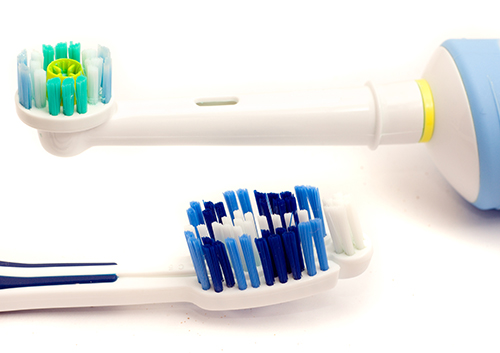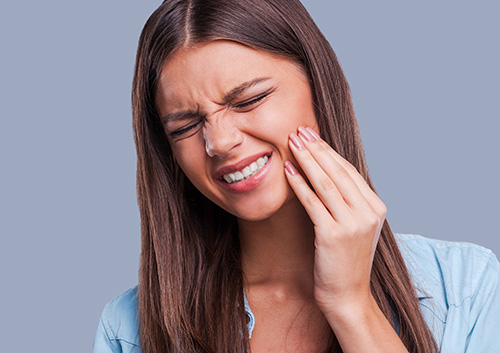July 18th, 2017

As you age, it becomes even more important to take good care of your teeth and dental health. According to the Centers for Disease Control and Prevention, approximately one-fourth of adults age 65 and older have no remaining teeth. What's more, nearly one-third of older adults have untreated tooth decay.
Oral health, regardless of age, is crucial to overall good health. Ideally, we all want to keep your natural teeth, but whether you're caring for natural teeth or dentures, advancing age may put older adults at risk for a number of oral health problems, including:
- Dry mouth
- Diminished sense of taste
- Root decay
- Gum disease
- Uneven jawbone caused by tooth loss
- Denture-induced tissue inflammation
- Overgrowth of fungus in the mouth
- Attrition (loss of teeth structure by mechanical forces)
- Oral cancer
These conditions may not be diagnosed until it is too late. If you want to feel good, stay healthy, and look great throughout life, you might be surprised what a difference a healthy mouth makes.
Here are some tips for maintaining and improving your oral health as you become older:
- Brush twice a day with a toothbrush with soft bristles. You may also benefit from using an electric toothbrush.
- Clean between your teeth once a day with floss or another interdental cleaner.
- If you wear full or partial dentures, remember to clean them on a daily basis. Take your dentures out of your mouth for at least four hours every day. It’s best to remove them at night.
- Drink tap water. Since most contains fluoride, it helps prevent tooth decay no matter how old you are.
- Quit smoking. Besides putting you at greater risk for lung and other cancers, smoking increases problems with gum disease, tooth decay, and tooth loss.
- Visit Erich M. Werner, D.D.S. regularly for a complete dental checkup.
If you have any questions about keeping up with your oral hygiene at home, please give us a call!
July 11th, 2017

You live in the golden age of toothbrushes. Until a few decades people used twigs or brushes made from animal hair to clean their teeth: not very soft and none too effective.
Now, you have a choice of manual brushes with soft, medium, or hard bristles. Or you might choose to go with an electric toothbrush instead.
Have you ever wondered whether manual or electric brushes provide better cleaning? Actually, they both do the job. The key is to brush and floss every day, regardless of the kind of brush you prefer.
At our Los Gatos, CA office, we like to say the best brush is the one you'll use. So if you prefer manual, go for it. If you prefer electric, turn it on.
Both types have their advantages but both types will get the job done as far as removing plaque.
Electric Toothbrushes
- Provide power rotation that helps loosen plaque
- Are great for people with limited dexterity due to arthritis or other problems
- Are popular with kids who think the electric brushes are more fun to use
- Can come with variable speeds to help reduce pressure on sensitive teeth and gums
Manual Toothbrushes
- Can help brushers feel they have more control over the brushing process
- Allow brushers to respond to twinges and reduce the pressure applied to sensitive teeth and gums
- Are more convenient for packing when traveling
- Manual brushes are cheaper and easier to replace than the electric versions.
In many ways, the golden age is just beginning. There are already phone apps available to remind you to brush and floss. New apps can play two minutes worth of music while you brush, help you compare the brightness of your smile or help explain dental procedures. Maybe someday we’ll even have programs that examine your teeth after brushing and identify spots you might have missed.
July 4th, 2017

The dog days of summer are upon us, and what better time for Dr. Werner and our team to ask our patients about their summer!
Whether you visited our nation’s capital, went on a camping trip, or just stayed in Los Gatos, CA and relaxed, we want to know how you’re all spending your summer! Please feel free to share your summer plans and experiences with us below or on our Facebook page as summer rolls on!
June 27th, 2017

You just crunched down on a piece of hard food when you suddenly realize there is something hard still in your mouth. Your nightmare is confirmed when you retrieve a piece of your tooth from your mouth. You chipped your tooth; now what?
Obviously, the first thing you need to do is call our Los Gatos, CA office. While we make every effort to see emergent cases immediately, you may have to wait a day or so before you can see Dr. Werner. Luckily, it’s easy to take care of your chipped tooth while you wait.
How to Take Care of a Chipped
The last thing you want is for the tooth to become infected or break even more. Let’s look at a few things you can do:
- If the chipped tooth is causing you pain take an over-the-counter pain medication, like Tylenol. Always follow the directions on the label.
- You should also rinse your mouth with lukewarm saltwater, as this will help prevent an infection from setting in.
- If your chipped tooth has a sharp edge, cover it up with a piece of wax to prevent it from cutting you cheek, tongue, or lip.
- If you have to eat, make sure you eat soft foods and don’t bite down on the chipped or broken tooth.
Treatment Options for a Chipped Tooth
- Dental Filling and Bonding – If you only have a small chip in your tooth, Dr. Werner will probably fix it with a filling. If it is a front tooth, we may bond the tooth using a tooth-colored compound.
- Dental Crown or Cap – If you broke a large piece of your tooth, we may grind the remaining part of your tooth and put a crown or cap on it.
- Dental Veneers – If you chipped or broke your front tooth then choosing a dental veneer may be your best choice. It will make your tooth look completely normal.
- Root Canal – If you cracked your tooth and the center (pulp) of the tooth is exposed and infected, you will need a root canal. If the center of your tooth is exposed, it becomes vulnerable to bacteria that will cause your tooth to abscess.
Chipping or breaking your tooth is never a good thing, and you should always call our Los Gatos, CA office right away. The sooner you get your tooth repaired the less likely you are to have any problems with it.





 Website Powered by Sesame 24-7™
Website Powered by Sesame 24-7™